
Axiomathes
Scope & Guideline
Unlocking New Perspectives in Mathematical Philosophy
Introduction
Aims and Scopes
- Philosophical Foundations of Mathematics:
The journal addresses various philosophical issues related to mathematics, such as mathematical objectivity, the nature of mathematical truth, and the role of thought experiments in mathematical reasoning. - Interdisciplinary Approaches to Scientific Inquiry:
Axiomathes promotes interdisciplinary research that connects philosophy with other domains such as cognitive science, physics, and computational theory, fostering a dialogue between philosophical concepts and empirical findings. - Exploration of Historical and Contemporary Philosophies:
The journal delves into historical philosophical perspectives, including those of Aristotle, Kant, and Hume, while also engaging with contemporary philosophical debates and theories. - Causal and Epistemological Investigations:
Research published in Axiomathes often investigates causal relationships, epistemic frameworks, and the implications of social power and justice within scientific and mathematical practices. - Mathematical Thought Experiments and Their Implications:
The journal features discussions on the use of thought experiments in mathematics and science, examining their role in shaping understanding and knowledge.
Trending and Emerging
- Cognitive Science and Mathematics:
There is a growing interest in the cognitive processes involved in mathematical thinking and understanding, with papers exploring how cognitive technology and theories enhance mathematical learning. - Relational and Contextual Theories:
Emerging research emphasizes relational approaches to understanding mathematical objects and concepts, highlighting the contextual nature of knowledge and its implications for epistemology. - Interdisciplinary Methodologies:
The journal increasingly features research that integrates methodologies from various disciplines, such as physics, neuroscience, and social sciences, to enrich philosophical discussions. - Ethics and Justice in Scientific Practices:
There is a rising focus on the ethical implications of scientific and mathematical practices, including discussions on social justice, power dynamics, and their effects on knowledge production. - Explorations of Non-classical Logics:
Emerging themes include investigations into non-classical logics and their applications, reflecting a trend towards diversifying the logical frameworks used in philosophical discourse.
Declining or Waning
- Traditional Platonism in Mathematics:
Papers advocating for a strict Platonist view of mathematics seem to be less frequent, indicating a shift towards more constructivist or nominalist perspectives. - Historical Accounts of Mathematics:
While historical perspectives remain important, the specific focus on detailed historical accounts of mathematical theories and figures has decreased, with more emphasis on contemporary applications and interdisciplinary connections. - Descriptive and Prescriptive Norms in Mathematics Education:
Research centered on normative claims in mathematics education is becoming less prevalent, suggesting a move towards exploring practical applications of mathematical understanding and cognitive processes.
Similar Journals
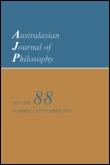
AUSTRALASIAN JOURNAL OF PHILOSOPHY
Elevating Philosophical Discourse Since 1947Australasian Journal of Philosophy, published by Routledge Journals, Taylor & Francis Ltd, serves as a premier platform for scholarly discourse in the field of Philosophy. With its origins dating back to 1947, this esteemed journal maintains a rich tradition of fostering high-quality, peer-reviewed research and is recognized for its significant contribution to the philosophy community. Holding a distinguished Q1 ranking in the field for 2023 and standing at #75 out of 806 in the Scopus Arts and Humanities ranking, it occupies a vital niche in advancing philosophical knowledge and inquiry. Although the journal is not open access, it periodically offers articles that contribute to the dissemination of philosophical thought, making it a valuable resource for researchers, professionals, and students alike. The AUSTRALASIAN JOURNAL OF PHILOSOPHY continues to inspire and challenge thinkers worldwide as it presents critical analyses, innovative ideas, and rigorous arguments, ensuring its relevance and importance in contemporary philosophical discussions.

Revista de Filosofia Aurora
Bridging Local Perspectives with Global InsightsRevista de Filosofia Aurora, an esteemed journal in the field of Philosophy, is published by the Pontificia Universidade Catolica do Parana in Brazil. With an ISSN of 2965-1557 and E-ISSN of 2965-1565, this Open Access journal has been dedicated to the dissemination of philosophical inquiry and discourse since 2003. As a reputable Q3 journal as per the 2023 category quartiles, it serves as a vital platform for scholars, enhancing access to contemporary philosophical discussions and contributions. The journal accepts a diverse range of articles, including theoretical explorations and practical applications within the field, inviting submissions from dedicated researchers and practitioners around the globe. Its commitment to open access ensures that scholarly work reaches a wide audience, fostering further exploration and dialogue within the philosophical community. Located in the heart of Curitiba, Brazil, the journal continuously strives to connect local and international perspectives, making significant contributions to the global philosophical landscape.

Cosmos and History-The Journal of Natural and Social Philosophy
Exploring the Interplay of Thought and SocietyCosmos and History - The Journal of Natural and Social Philosophy is a pioneering academic journal dedicated to the exploration of philosophical questions within both the natural and social realms. Published by COSMOS PUBL COOPERATIVE in Australia, this Open Access journal has been committed to disseminating knowledge freely since 2005, allowing researchers and scholars from around the globe to access cutting-edge philosophical discourse. With an impressive status, it ranks in the Q2 category for Philosophy in 2023, and holds a commendable position at rank #399 out of 806 in the Arts and Humanities - Philosophy category on Scopus, placing it within the 50th percentile of its field. The journal covers a wide spectrum of topics, pushing the boundaries of interdisciplinary thought and fostering robust academic discussions that contribute to both theoretical and practical applications of philosophy. By addressing pressing contemporary issues, Cosmos and History serves as an invaluable resource for researchers, professionals, and students engaged in the nuanced interplay between philosophical ideas and societal developments, paving the way for future inquiries and innovations.
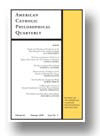
AMERICAN CATHOLIC PHILOSOPHICAL QUARTERLY
Fostering Interdisciplinary Connections in Faith and PhilosophyAmerican Catholic Philosophical Quarterly, published by the American Catholic Philosophical Association, is a prestigious journal that has been disseminating scholarly work in the fields of philosophy and religious studies since 1996. With its headquarters in Bronx, NY, this quarterly explores diverse philosophical inquiries framed through a Catholic lens, making it a vital resource for researchers, professionals, and students seeking to deepen their understanding of philosophical discourse intertwined with religious thought. Although the journal does not currently offer open access options, its rigorous peer-reviewed content ensures a high academic standard, reflected in its Scopus rankings—#257 in Religious Studies and #393 in Philosophy, placing it in the 60th and 51st percentiles respectively in the 2023 categorization. Aimed at advancing philosophical dialogue and fostering interdisciplinary connections, the *American Catholic Philosophical Quarterly* stands as a significant platform for those committed to exploring the complexities of faith, reason, and morality in contemporary society.
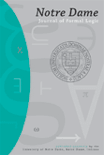
Notre Dame Journal of Formal Logic
Advancing the Frontiers of Formal LogicNotre Dame Journal of Formal Logic is a premier academic publication dedicated to the advancement of research in the field of logical studies. Published by DUKE UNIVERSITY PRESS, this journal has been a significant contributor to the discipline since its inception in 1960, with an impressive convergence of scholarly articles expected to continue through 2024. With its focus on rigorous formal logic, the journal plays a crucial role in fostering discussions that bridge mathematics and philosophical inquiry, holding a notable Q2 ranking in the 2023 Logic category. Despite its non-open-access status, the journal reaches a wide audience of researchers, professionals, and students committed to exploring the foundational aspects of logics. Located in Durham, NC, it provides a platform for innovative thought and critical engagement within the logic community. With its impactful contributions, the Notre Dame Journal of Formal Logic stands as a vital resource for those seeking to deepen their understanding of both classic and contemporary logical theories.

Journal of French and Francophone Philosophy
Bridging Historical Insights with Contemporary Issues.Journal of French and Francophone Philosophy is a prominent academic journal dedicated to the exploration and dissemination of scholarly work in the field of French and Francophone philosophy. Published by the University of Pittsburgh Library System, this journal has been a significant player in the discourse on philosophical thought since its inception in 1989, operating under an Open Access model to ensure broad accessibility to its content. With its ISSN 1936-6280 and E-ISSN 2155-1162, the journal highlights critical debates, methodologies, and cultural contexts that shape French and Francophone philosophical traditions. The journal's commitment to academic excellence is underscored by its adherence to high scholarly standards, making it an essential resource for researchers, professionals, and students eager to engage with contemporary philosophical issues and historical analyses alike. By facilitating dialogue among diverse philosophical perspectives, it continues to enhance the academic landscape and promote the relevance of French and Francophone thought in a global context.

Epistemology & Philosophy of Science-Epistemologiya i Filosofiya Nauki
Cultivating a Dialogue on Knowledge and CultureEpistemology & Philosophy of Science-Epistemologiya i Filosofiya Nauki is a prestigious journal published by the Russian Academy of Sciences - Institute of Philosophy, dedicated to advancing the discourse in the fields of epistemology, philosophy of science, and related disciplines. With a distinguished presence in academia, this journal is recognized for its exceptional contributions, evident through its categorization as a Q2 journal in Arts and Humanities and Philosophy, and a Q1 journal in Cultural Studies. Covering an expansive scope from 2017 to 2023, it facilitates a vital dialogue among scholars and professionals aiming to explore the intersections of knowledge, culture, and education. Although currently not open access, the rigorous peer-review process ensures that only high-quality research is published, enriching the intellectual landscape. The journal's commendable rankings in Scopus, particularly in Arts and Humanities and History and Philosophy of Science, reflect its commitment to scholarly excellence. For researchers, educators, and students, Epistemology & Philosophy of Science serves as an essential resource for understanding and contributing to the ongoing philosophical dialogues that shape our comprehension of scientific inquiry.

FOUNDATIONS OF PHYSICS
Advancing Understanding Through Philosophical InquiryFOUNDATIONS OF PHYSICS is a prestigious journal published by SPRINGER, dedicated to the interdisciplinary exploration of the philosophical and historical dimensions of physics. With a rich publication history spanning from 1970 to 2024, the journal holds a prominent position in the academic community, evidenced by its Q1 ranking in both History and Philosophy of Science and Philosophy, as well as a respectable Q2 in Physics and Astronomy for miscellaneous topics. The journal's ISSN is 0015-9018 and its E-ISSN is 1572-9516, facilitating access to a wide array of scholarly articles. Although it does not offer an open access option, the journal remains an invaluable resource for researchers, professionals, and students eager to delve into the complexities that intertwine physics with philosophical inquiry and historical context. As a critical platform for groundbreaking research, FOUNDATIONS OF PHYSICS fosters vibrant discourse and encourages innovative thought within these essential fields.
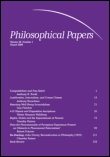
Philosophical Papers
Championing Rigorous Scholarship in PhilosophyPhilosophical Papers, an esteemed journal published by Routledge Journals, Taylor & Francis Ltd, stands as a pivotal resource in the field of philosophy. Having established its presence since 1972, this journal has converged a wealth of intellectual discourse and contributes to the continuous development of philosophical thought until 2024. With a prestigious Q1 category ranking in the arts and humanities, and a notable 86th percentile ranking in Scopus's philosophy category, it underscores its commitment to rigorous scholarship and influential research. Although Open Access options are not currently available, the journal remains a vital platform for philosophers, researchers, and students aiming to engage with pivotal philosophical debates and advancements. Set in the UK, Philosophical Papers exemplifies the intersection of tradition and innovation in philosophical inquiry, making it an indispensable reference for anyone dedicated to exploring the complexities of human thought and existence.
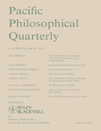
PACIFIC PHILOSOPHICAL QUARTERLY
Advancing Philosophical Discourse for TomorrowWelcome to the PACIFIC PHILOSOPHICAL QUARTERLY, a leading journal in the field of philosophy, published by Wiley. With an impressive impact factor and ranked in the top 15% of its category (Q1 in Philosophy), this esteemed journal has become a vital source for scholars and practitioners alike. Established in 1996, the journal presents groundbreaking articles that explore contemporary philosophical issues, ensuring its relevance through converged contributions up to 2024. With robust Scopus rankings, including a position of #122 out of 806 in the Arts and Humanities category, the quarterly serves as a platform for innovative ideas and rigorous debates in the philosophical community. Though it does not offer open access, its insights are invaluable for researchers, professionals, and students eager to deepen their understanding of philosophical discourse.